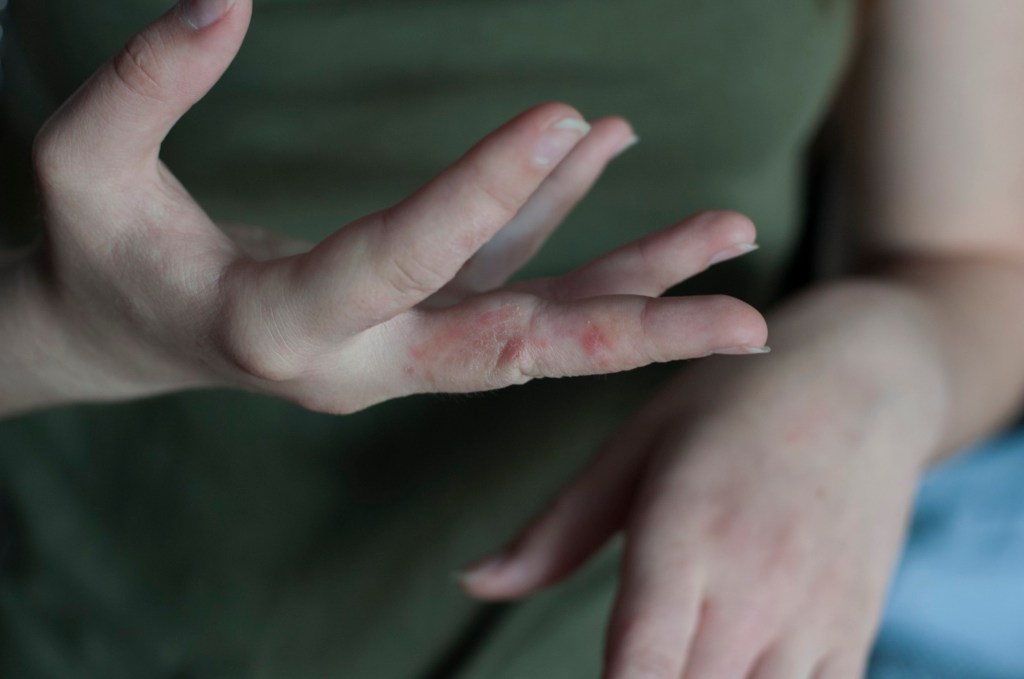Doctors have warned of a scurge of scabies cases throughout the UK (Picture: Getty)
Doctors have warned of a ‘nightmare’ surge in scabies cases throughout the UK, and say the situation poses a major public health threat.
Scabies is a skin condition caused by parasitic mites, who burrow beneath the skin and lay their eggs. Once hatched, they cause intense itching and an irritable rash, which becomes much worse at night.
The condition is spread through direct skin contact, and is considered highly contagious.
It comes following a recent outbreak at a top London university, which saw a number of fashion students become infected with the disease after making contact with a roll of contaminated fabric.
Scabies is a skin disease caused by a parasitic mite which furrows beneath the skin and lays eggs, which cause intense itching and rashes (Picture: Getty)
The surge in cases has sparked concern amongst dermatologists, who are struggling to treat patients quickly enough to stop the condition from spreading.
In the north of England, the Guardian reports GPs have seen double the amount of cases than normal throughout November, and there appears to be no sign of it slowing down.
Dermatologists who spoke to the publication said the situation had become an ‘absolute nightmare’, with outbreaks reported in care homes, nursing homes and in university accommodation.
Some patients have even tried to purchase expensive alternative treatments from outside the UK as their suffering has become progressively worse.
To view this video please enable JavaScript, and consider upgrading to a web
browser that
supports HTML5
video
At least two students at St. Martin’s college in London were thought to have been infected by the parasites in December after they were believed to have come into contact with contaminated fabric.
This prompted the college to shut their studios and deep clean the entire department – just days ahead of Christmas deadlines.
A similar outbreak was also reported at Oxford University in 2019.
One student told Metro.co.uk: ‘It was madness, there were so many students who had deadlines at one of the busiest times of the year.
‘People were so nervous because they had been sitting in the studios all day without knowing that they could have contracted something.
‘There were also rumours flying around about who had it and who might have had it.’
Prof Kamila Hawthorne, the chair of the Royal College of GPs, told the Guardian that while scabies was not an inherently serious condition, it could prove to be extremely irritating if not properly treated and could increase the risk of infections or make existing skin conditions such as eczema much worse.
People suffering from scabies are encouraged to see a GP immediately (Picture: Getty)
‘It can also affect a patient’s quality of life, so quick treatment is important,’she told the publication.
‘Since July, GPs have seen a growing rate of scabies presentations – at a consistently higher level than the five-year average and the seasonal norm. This has been particularly pronounced in the north of England.
‘At the end of November, the rate of scabies was three cases per 100,000 of the population which is double the seasonal average.’
She added: ‘The treatment for scabies is a topical cream or lotion that can be purchased in pharmacies, or by prescription in general practice. However, there have been reports of shortages in the two most commonly used medications, permethrin cream and malathion lotion.
‘When any prescribed medication is unavailable, or in short supply, it is worrying for GPs, pharmacists and patients alike.
‘GPs and pharmacists are already under enormous pressures to provide care for their patients during the peak season, and any medication shortages, even if they are only temporary, make the situation worse.’
Anyone can get scabies, and the condition has nothing to do with poor hygiene.
Dr Tess McPherson, the president of the British Society for Paediatric and Adolescent Dermatology, said it was vital to emphasise that people did not get scabies because they were unhygienic. ‘We must reduce any stigma associated with having scabies so that people do seek treatments when needed.’
Get in touch with our news team by emailing us at webnews@metro.co.uk.
For more stories like this, check our news page.
Doctors are struggling to treat patients fast enough to stop the condition from spreading.


